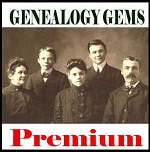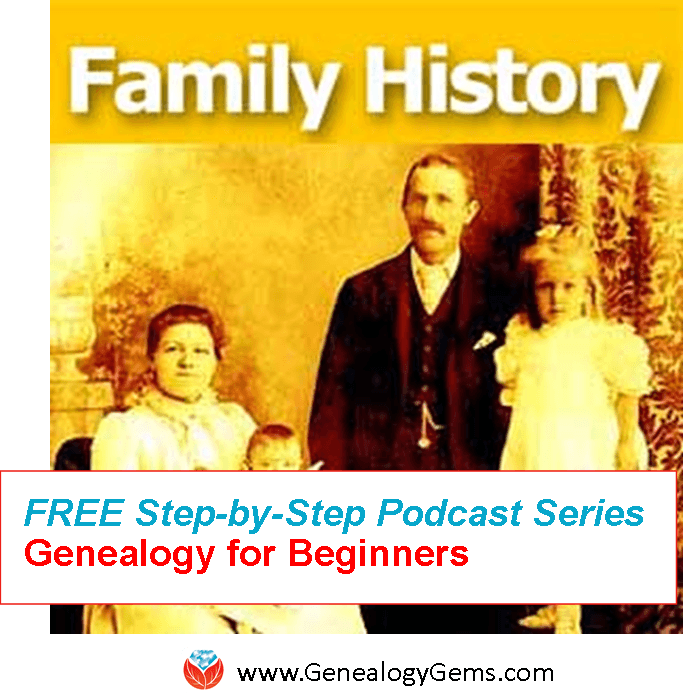by Lisa Cooke | Aug 20, 2015 | 01 What's New, Church, FamilySearch, images, Listeners & Readers, Newspaper, United States
 A listener sent in her favorite resources for Ohio genealogy research. Could any of these help you find your Buckeye State ancestors?
A listener sent in her favorite resources for Ohio genealogy research. Could any of these help you find your Buckeye State ancestors?
Recently we heard from Genealogy Gems Premium member Kate, after she listened to Premium podcast episode 125 with Cheryl McClellan (available to Premium members). “That [episode] was perfect for my situation. I am looking at our budget and thinking of letting my 12 year subscription to Ancestry drop. Cheryl’s comments helped me make that decision….Lisa, you always have answers when I most need them.”
“Wanted to share a few sources that have I have found very helpful in Ohio genealogy research. We live in Michigan but have used the Toledo Public Library for research for years as many ancestors have lived there.
- Toledo Public Library: The Blade obituary index, 1837 to present. Through an online search from your home, you can request an obit and there is no fee. You may request up to 3 at a time. They will look them up when they have time and email you an image of the obit. It has taken up to a couple of weeks. They are very helpful. They also gave me a link to Google News so I can look myself on the Toledo Blade images. As you know there are gaps and not all images are legible. The Library has the paper on microfilm to fill in where needed.
- FamilySearch has an index and images for Ohio Deaths 1908 – 1953. This has the full image of death certificates. You have to create a user account to see the images. Wow, what a great help to understand how all these people are related. Just one example in my tree: there are 11 Mary Lehaneys. Some never married, some did. They all died as Mary Lehaney and if their husband died, they are listed as Mrs Tom Lehaney etc.
- FamilySearch has the Toledo Catholic Diocese record images. My paternal line is mostly Catholic and lived in Toledo area for many years. Again, not indexed, but when you know about the time [can you can find] not only birth and marriages, [but] the complete burial records from the Catholic Cemeteries.
 Anyone who researches in Ohio may find these [resources] invaluable….Lisa, keep your beautiful smile and thanks for all your help!”
Anyone who researches in Ohio may find these [resources] invaluable….Lisa, keep your beautiful smile and thanks for all your help!”
Thank YOU, Kate! We hope her suggestions prove helpful to many of you doing Ohio genealogy! Anyone can become a Genealogy Gems Premium member like Kate. Members get 12 months of access to monthly Premium podcast episodes and the full Premium podcast archive–all packed with genealogy news, tips and interviews like the one that helped Kate. We also have more than 2 dozen in depth video classes for Premium members only, with more added regularly. These include our entire series on Evernote for genealogy! Click here to see the current list of Premium videos.
by Lisa Cooke | Jun 11, 2014 | 01 What's New, Beginner, Family History Podcast, Libraries, Research Skills

Listen to the Family History: Genealogy Made Easy podcast by Lisa Louise Cooke. It’s a great series for learning the research ropes and well as refreshing your skills.
Family History: Genealogy Made Easy with Lisa Louise Cooke
Republished June 11, 2014
[display_podcast]
Download the Show Notes for this Episode
Welcome to this step-by-step series for beginning genealogists—and more experienced ones who want to brush up or learn something new. I first ran this series in 2008-09. So many people have asked about it, I’m bringing it back in weekly segments.
Episode 35: Do Your Genealogy at the Public Library, Part 2
In Episode 34, Patricia Van Skaik, Manager of the History and Genealogy Department of the Public Library of Cincinnati and Hamilton County, talked with me about the unique genealogical resources in public libraries just waiting to be discovered. She gave us some great ideas on how to prepare for your visit to get the most out of your time at the library.
Today, we go deeper into genealogy research at the public library. Pat is back and she talks to us about:
- How to search an online library card catalog, including advanced search methods;
- What kinds of unique collections may be at public libraries, and helps us learn to ask for exactly what we want!
- The obstacles librarians face when it comes to cataloguing large and unique collections that may interest genealogists.
So dust off your library card and grab your book bag and let’s head back to the public library!
Top Tips from Pat and Lisa
- You don’t have to be advanced on computers to use advanced searches. Use these to home in clearly on what you’re looking for!
- Don’t think of the public library as just as place to go look at their holdings. Talk to librarians about how to use resources (databases, websites) and how to evaluate what you’ve discovered.
- Some items are buried at the library. Asking for help may lead to accessing just the records you want. Examples include items in pull-out collections, closed stacks (not in the public areas of the library) and maps, which aren’t always listed in the card catalogue.
- Tell the staff what materials are important to you. Your interest may lead these items to become more accessible, or be indexed or digitized.
Separate your search terms in advanced searches. Don’t just keyword search “marriages San Francisco.” Enter these terms separately in the advanced search. You may bring up items not found while searching these keywords together.
A lot of local history and genealogy materials do not circulate through interlibrary loan. Some items are totally unique and people travel to that library to see it, so they don’t send it out. One option is to ask the librarian to check the index and table of contents, then scan or photocopy the pages of interest to you and send them. There may be a charge for this but it’s better than not being able to get the book at all!
Finally, don’t make assumptions. Particularly, Pat says, don’t assume that…
- A small library doesn’t have much advanced technology;
- A library resources only cover its immediate locale; and
- If you can’t see it is not there! Ask about closed stacks.
Links for Public Libraries and Library Resources
WorldCat.org (to search for materials across multiple libraries)
Library Finder websites:
Australia
Canada
U.K.
U.S.
by Lisa Cooke | Jun 3, 2014 | 01 What's New, Beginner, Family History Podcast, Libraries, Research Skills

Listen to the Family History: Genealogy Made Easy podcast by Lisa Louise Cooke. It’s a great series for learning the research ropes and well as refreshing your skills.
Family History: Genealogy Made Easy with Lisa Louise Cooke
Republished June 3, 2014
[display_podcast]
Download the Show Notes for this Episode
Welcome to this step-by-step series for beginning genealogists—and more experienced ones who want to brush up or learn something new. I first ran this series in 2008-09. So many people have asked about it, I’m bringing it back in weekly segments.
Episode 34: Do Your Genealogy at the Public Library, Part 1
Did you know there is a gem of a genealogical resource right in your own backyard? Well, at least in your own neighborhood—and also in just about every neighborhood where your ancestors lived. The public library is one of the most underestimated sources of genealogical information around! It’s free. It has better hours than most government-run agencies. There are staff with research skills, knowledge of their locale and knowledge about their collections. I have invited Patricia Van Skaik, Manager of the History and Genealogy Department of the Public Library of Cincinnati and Hamilton County to join us here on the podcast. In this episode she’s going to give us the inside scoop on the unique genealogical resources that are tucked away in public libraries just waiting to be discovered.
What’s at the library? Each library has unique materials for its locale. Examples include:
- City directories
- Maps
- Obituary indexes
- Partnerships with local societies and clubs, and organizations (access to databases)
- Unique library expertise
TIP: Check with the public libraries in each location where your ancestors lived TIP: Genealogy holdings vary, and often have to do with what local constituents want.
TIP: Get involved and make requests at your local library if you want more genealogy resources.
How to prepare for your visit
- Determine your questions ahead of time and gather the appropriate ancestor information to take with you.
- See if they have a genealogy area on the website. There are lots of things on the library website that are not in the catalogue (special exhibits, digitized images, and databases) Don’t just jump straight to the catalogue.
Search the online catalog and identify the books and resources you want
- Look for the geographic area, not the person’s surname (town, county, geographical area)
- Use the Advanced search – “you don’t have to be an advanced researcher to use the advanced search!”
- Don’t use the word “genealogy” in your search. It’s pretty useless.
4 more tips from Lisa and Patricia
Email in advance – ask some questions ahead of time:
- Is the website up to date?
- Reconfirm hours of operation
- Parking?
- What’s the best time to come for more service?
- Is wi-fi available?
- Do you need change for copy machines?
- Are there any special collections you should know about?
- Do they offer orientations?
Plan a group visit: Some libraries will make special accommodations for a group visit. Ask if they will provide a tour geared to genealogy. And they may have a meeting room where you can have lunch or meet. It’s a small investment in time and money to make sure that you’re going to get the most of the time you’re going to spend there.
Get their expertise! Librarians don’t just know the collection, but they also know research strategy, collection contents, all the questions that have come before, and local area resources.
Phrase your questions for success: Pose questions in terms of a query. For example: “I’m trying to find evidence of someone’s death during this time frame. What materials do you have that may help?” (Don’t just ask specifically for obituaries or government death records—they may not have one but they may have other resources you’re not thinking of.)
Tune in next week to Episode 35 to learn more about researching at the public library, like tips for advance searching those online card catalogs, thinking like a librarian, unique collections at librarians and the types of questions you can ask your public library staff.
 A listener sent in her favorite resources for Ohio genealogy research. Could any of these help you find your Buckeye State ancestors?
A listener sent in her favorite resources for Ohio genealogy research. Could any of these help you find your Buckeye State ancestors? Anyone who researches in Ohio may find these [resources] invaluable….Lisa, keep your beautiful smile and thanks for all your help!”
Anyone who researches in Ohio may find these [resources] invaluable….Lisa, keep your beautiful smile and thanks for all your help!”




